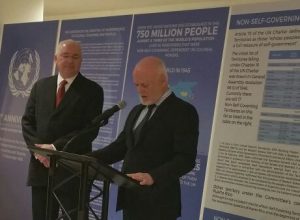As delivered
Remarks by H.E. Mr. Peter Thomson, President of the 71st Session of the General Assembly at the Opening of the Exhibition to Commemorate 56th anniversary of the Declaration on the Granting of Independence to Colonial Countries and Peoples
16 December 2017
Excellencies,
Friends,
I am honoured to join you today to open this exhibition, in commemoration of the 56th anniversary of the Declaration on the Granting of Independence to Colonial Countries and Peoples, proclaimed in General Assembly resolution 1514 (XV) of 14 December 1960.
I commend the Chair, Bureau and entire membership of the Special Committee of 24 for putting together this important exhibition.
The information displayed on these panels is a stark reminder to all of us of what has been achieved since the Declaration and the remaining challenges facing the international community on the issue of decolonization.
Back in the days when the declaration was made, the UN’s mantra was the three D’s: disarmament, development and decolonisation.
Since then enormous progress has been made, with 80 former colonies having gained independence and joined our family of nations.
But while we celebrate that great success, we should remember that seventeen Non-Self-Governing Territories remain on the UN’s decolonization agenda .
Half a century after Member States agreed in paragraph 1 of the Declaration that the subjection of peoples to alien domination and exploitation constituted a denial of fundamental human rights, was contrary to the UN Charter and an impediment to the promotion of world peace, it is unacceptable that we have so many pending decolonization cases.
As I noted in my statement to the 4th Committee in October, it is well past time for the Organization, through the Special Committee, to resolve the status of each of these Territories, once and for all, to the full satisfaction of all stakeholders.
The establishment of the Special Committee in 1961, with a mandate to monitor the implementation of the Declaration and make recommendations, underscores the significant role of the Committee in advancing the Organization’s decolonization goals, as outlined in the Declaration, in Chapter eleven of the Charter and in numerous General Assembly resolutions.
Having represented my country, Fiji, in the work of the Committee in the past, I am well aware of the complexities of the specific contexts of some of the remaining Non-Self-Governing Territories before the Committee.
While commending the Committee’s increasing efforts to engage more with the peoples of the Non-Self-Governing Territories, the administering Powers, concerned Governments and other stakeholders, I encourage it to redouble efforts to find innovative ways to conclude the key issues at the heart of each remaining Non-Self-Governing Territories and thereby to conclude the work of the Committee itself.
In 2020, just four years away, the Third International Decade for the Eradication of Colonialism (2011-2020) will come to an end.
Let us make these four years count, by taking bold action to put in place action plans for dealing with the remaining Non-Self-Governing Territories, on a case-by-case basis.
The 2030 Agenda for Sustainable Development – a universal master plan for eliminating extreme poverty, empowering women and girls, combating discrimination and inequality, promoting the rule of law, tackling climate change and protecting the environment, provides us with an agreed framework for realizing the human rights of all peoples, and for creating peaceful and inclusive societies.
Let us ensure that the Non-Self-Governing Territories are not left behind, and that they realize their full rights to benefit from the SDGs. I commend the organizers of this exhibition and look forward to sharing a viewing of it with you.
Thank you.


